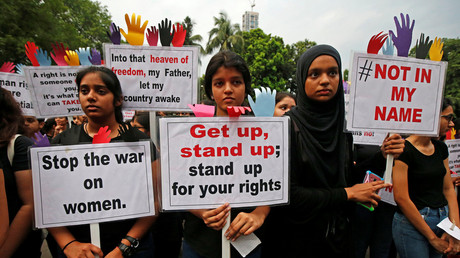Sri Lanka to reinstate death penalty in anti-drug war ‘inspired’ by Philippines’ Duterte
Sri Lanka is going to reinstate capital punishment for drug dealers who coordinate criminal activities from behind bars, as it draws inspiration from the brutal anti-drug campaign led by Philippines President Rodrigo Duterte.
“From now on, we will hang drug offenders without commuting their death sentences,” Rajitha Senaratne, government spokesman, announced on Wednesday.
Sri Lankan president Maithripala Sirisena has told the government, which earlier had unanimously backed the reinstatement of capital punishment, that he “was ready to sign the death warrants,” the spokesman said.
The last execution in Sri Lanka took place back in 1976 and since then all death sentences in the country have been commuted to life in prison as successive presidents refused to sign death warrants.
“Although there are certain opinions regarding capital punishment in a Buddhist society, if a large number of criminal acts spread in such a society despite religious sermons, it will be necessary to take some timely actions to control crime,” the President’s Media Division cited Sirisena as saying.
There are currently 19 drug offenders in Sri Lanka, whose death sentences had been commuted to life, Senaratne said, adding that some of them continue coordinating trafficking from detention. Earlier this week, one of those drug dealers organized the smuggling of over 100 kilograms of heroin into the country.
The government spokesman has called the uncompromising war on drugs led by Rodrigo Duterte in the Philippines an example for Sri Lanka, saying that Colombo will also be using the military to curb trafficking.
“We were told that the Philippines has been successful in deploying the army and dealing with this problem. We will try to replicate their success,” Senaratne promised, as cited by AFP.
The Philippine authorities have acknowledged that 4,200 drug suspects, who were resisting law enforcement, were eliminated in the country since July 2016. But critics call the killings unlawful and claim that the death toll was far greater.
READ MORE: Murderer who ate his own eyeball is crazy, but that won’t stop his execution – court
Amnesty International has, meanwhile, said that Sri Lanka is heading in the “wrong direction” and urged the country to abandon its plans. “Sri Lanka has been a leader in the region, with an enviable record of shunning this cruel and irreversible punishment at a time when many other countries persisted with it,” Dinushika Dissanayake, the watchdog’s Deputy Director for South Asia, said in a statement. “By resuming executions after more than 40 years, Sri Lanka will do immense damage to its reputation.”
Think your friends would be interested? Share this story!






Comments are closed.